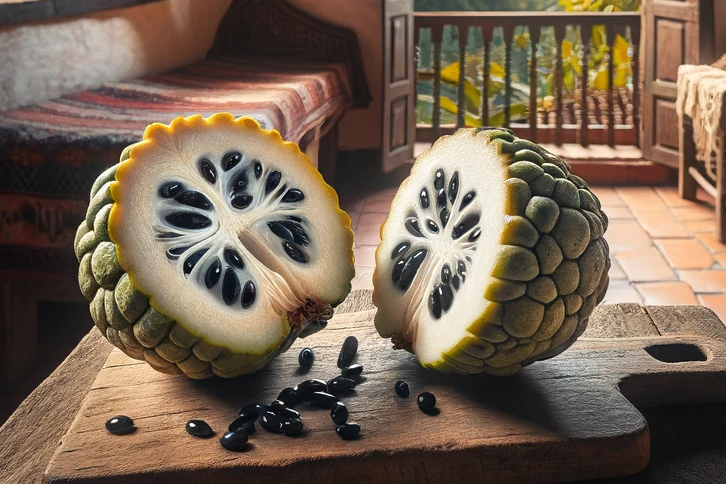Real guava

What is real guava?
The real guava (Psidium guajava) is a tropical fruit known for its high nutrient content and unique flavor. It originally comes from Central and South America, but is now grown in many tropical and subtropical regions around the world. The fruit has a green to yellow skin and pink to white flesh speckled with small edible seeds. Guavas are not only popular with humans, but can also be a healthy addition to a dog's diet.
Benefits of real guava for dogs
Rich in vitamins and minerals
Guavas are an excellent source of vitamin C, which boosts the immune system and acts as an antioxidant. They also contain vitamin A for healthy skin and eyes and potassium, which contributes to heart health. These vitamins and minerals are essential for maintaining overall health and vitality in dogs.
Promoting digestive health
With a high fiber content, guava can help regulate digestion and prevent constipation. Fiber is important for healthy bowel function and can also help control weight by promoting a feeling of fullness.
Antioxidant properties
Guavas contain antioxidant phytochemicals such as lycopene and beta-carotene, which can help protect cells from free radical damage. These antioxidants support overall health and can help prevent disease.
Disadvantages and risks of real guava for dogs
Potential danger from seeds
Although the seeds of the real guava are edible, they can pose a choking risk to smaller dogs. It is advisable to remove the seeds before offering guava to your dog to ensure a safe eating experience.
Stomach upset with excessive consumption
As with any dietary supplement, over-consumption of guava can cause stomach upset, especially in dogs that are sensitive to new foods. It is important to feed guavas in moderation and monitor your dog's reaction.
Allergic reactions
Although rare, there is always the possibility of allergic reactions when new foods are introduced. Watch your dog for signs of allergy, such as skin rashes or digestive upset, after eating guava.
True guava can be a healthy and tasty addition to your dog's diet, provided it is offered responsibly and in moderation. Its rich nutrients and antioxidants can provide various health benefits, from boosting the immune system to promoting digestive health. However, as with any change in your dog's diet, it's important to start with small amounts and pay attention to individual tolerance.
If you notice any signs of hypersensitivity or poisoning in your dog, you should see your vet immediately. We are not a substitute for a vet, but we try to be as accurate as possible. Every dog reacts differently and we recommend you get a second opinion or consult your vet if in doubt.
Stay healthy and take good care of your four-legged friend!😊
Similar to Real guava
Papau plants belong to the Annonaceae family and are native to North America, where they grow in forests and along riverbanks. They are known for their large, dark green leaves and small, fragrant...
Cherimoya belongs to the Annonaceae family, which also includes other exotic fruits such as the annona and the guanabana. The fruit is known for its green, heart-shaped exterior, which conceals a...
The papaya tree is a symbol of tropical sweetness and is often praised for its culinary and medicinal properties. While humans have been enjoying the benefits of this plant for centuries, the question...
The mango, known for its sweet taste and juicy texture, is a popular fruit with many people around the world. But what about our four-legged friends? Before we dive into the specific components of...



